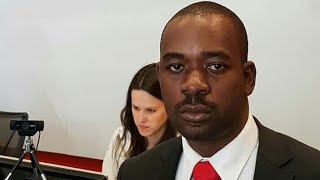By Tawanda Musariri
Leader of the opposition Movement for Democratic Change, Nelson Chamisa yesterday gave conflicting statements regarding his party’s appreciation of the judiciary system in Zimbabwe.
Chamisa put his ignorance of and arrogance towards the law bare during his maiden appearance before the Commission of Inquiry investigating the circumstances leading to the August 1 incident which left thousands of dollars’ worth of property destroyed and six people dead on the streets of Harare.
Chamisa told the Commission that he did not recognize the decision of the Constitutional Court which declared President Mnangagwa winner of the July presidential election despite claiming to have confidence and respect for the judiciary and the rule of law.
The Constitutional Court, which sits as an electoral court of appeal is the highest electoral dispute arbitrator with its decision being final and not subject to challenge.
“Whereas we had reservations about the process we were committed to pursue all the legal options to make sure that we avoid the process of instrumentalising protest as a tool for political engagement. What we are doing is constitutional. That’s why we went to the Constitutional Court. We are in the African Court even now,” said Mr Chamisa.
Despite this, it is surprising that the MDC is disputing the decision of the Constitutional Court of electoral appeal, a process that was done in the full glare of everyone interested and the international community via live broadcasting.
The party, contrary to his claims of shelving protest as a tool for achieving political ends, Chamisa wielded the Constitution, pronouncing the enshrined right to demonstration. He went ahead and displayed the party’s flagrant disregard of constitutionalism through its record violent protests, the one under scrutiny being a case in hand as scores of shops and vehicles were destroyed by persons chanting Chamisa’s name and MDC slogans.
The MDC’s flip flopping over the rule of law has become the party’s tradition. The party only wants to wield the arm of the law as a means to receiving judgements in its favour. Anything that does not buttress the party’s legal opinion is regarded as biased or illegal. Ironically, the party is home to teams of lawyers despite its rickety walk on the legal path.




